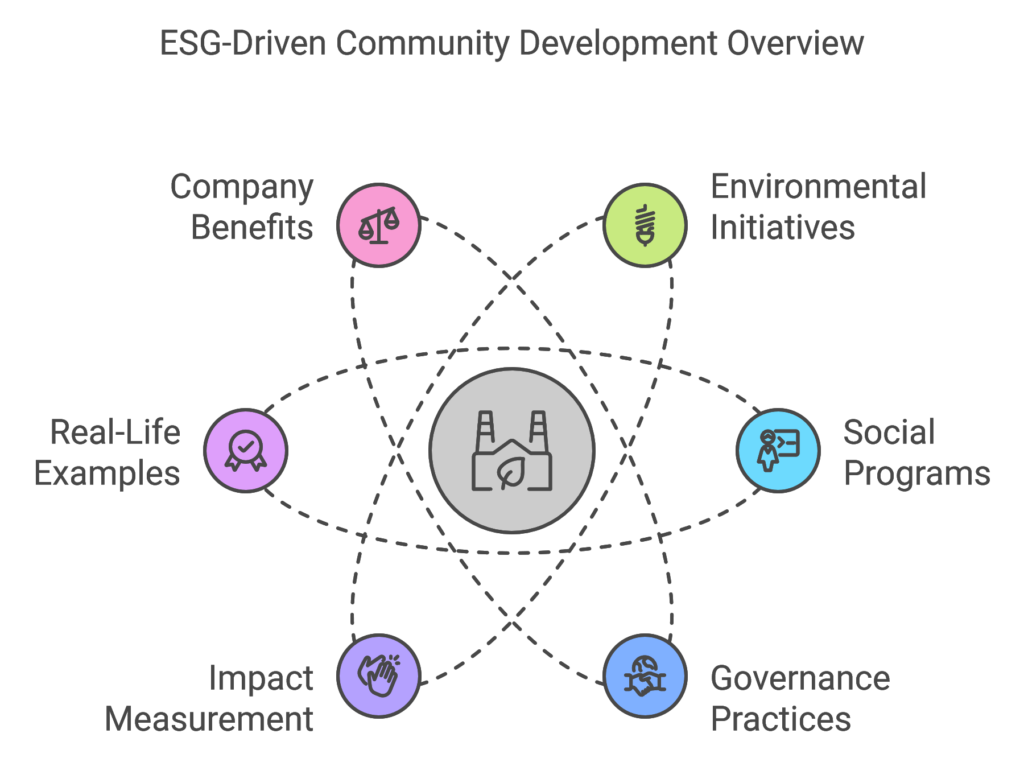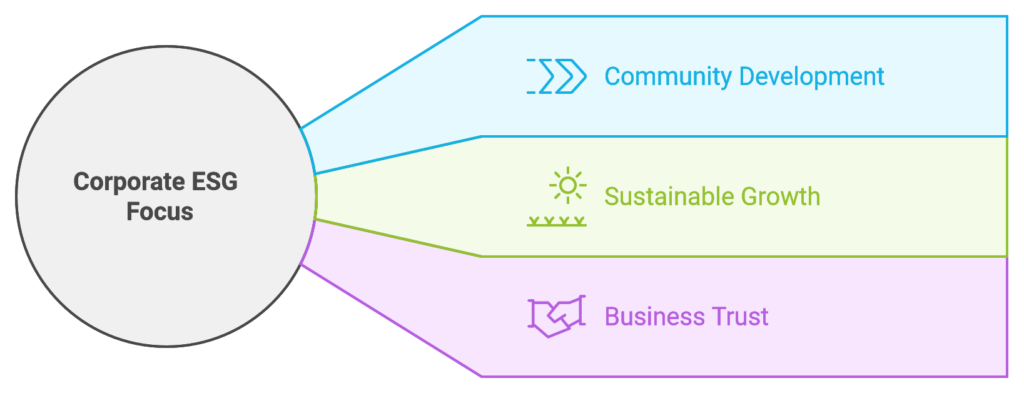As companies shift their focus beyond profits and towards creating positive impacts on society, Environmental, Social, and Governance (ESG) initiatives are becoming essential. By embracing ESG principles, companies not only strengthen their business models but also help drive community development, fostering trust, loyalty, and a shared commitment to societal well-being. In this blog, we’ll explore how companies can leverage ESG to make meaningful contributions to community development, improve local economies, and create sustainable growth for both business and society.

1. Why ESG Matters for Community Development
ESG principles guide businesses to make decisions that respect environmental sustainability, promote social well-being, and uphold ethical governance practices. Companies that commit to ESG-driven community development are recognized not just as economic entities but as partners in progress, focusing on long-term value for their communities. With these principles in mind, companies can:
- Enhance Local Infrastructure: Invest in projects that improve local facilities like roads, parks, and public spaces.
- Promote Economic Growth: Offer job training programs, support local suppliers, and create job opportunities.
- Build Trust and Reputation: Communities are more likely to support companies that actively engage in local development.
Through these initiatives, companies can support community development in ways that benefit both the public and their business, creating a win-win relationship.
2. Key ESG Initiatives for Community Development
a) Environmental Efforts to Protect and Preserve Community Spaces
Environmental sustainability is a critical component of ESG that companies can promote within communities by:
- Reducing Emissions: Implement eco-friendly production processes and offset emissions through green energy or reforestation projects.
- Supporting Renewable Energy: Partner with communities to install solar panels or wind turbines, reducing local dependence on non-renewable energy sources and cutting community energy costs.
- Promoting Conservation Efforts: Protect local biodiversity and natural resources by engaging in or sponsoring cleanup events, green spaces, and water conservation initiatives.
For example, companies in manufacturing can adopt sustainable practices and technologies that minimize waste, reducing their environmental footprint on local communities. These measures improve community health and show a commitment to preserving the environment for future generations.
b) Social Programs that Drive Inclusivity and Economic Empowerment
The social pillar of ESG focuses on creating a positive impact on people. Companies can strengthen their relationship with communities through:
- Job Training and Skill Development: Offer programs that equip locals with valuable skills in fields like technology, healthcare, and environmental management. This empowers individuals to find stable jobs, strengthening the local economy.
- Diversity and Inclusion Initiatives: Implementing inclusive hiring practices can make the workforce reflect the community. Companies can also sponsor educational programs that promote diversity, equal opportunity, and social equity.
- Healthcare and Education Support: Many companies fund community healthcare services and support local schools by providing resources, scholarships, and internships, investing in the long-term prosperity of the community.
An example here is companies in the tech industry launching coding bootcamps or scholarships for students in underserved areas, fostering a new generation of tech-savvy, employable youth while contributing to the social fabric of the community.
c) Governance: Transparency, Ethical Practices, and Local Partnerships
Governance involves ethical decision-making, transparency, and accountability, which are crucial in building trust with communities. Companies can:
- Prioritize Transparency: Keep the community informed about business operations that impact them. Regular updates and open communication foster trust and cooperation.
- Engage in Ethical Practices: Uphold labor rights, fair wages, and safe working conditions, ensuring the community views the company as a responsible employer.
- Forge Partnerships with Local Organizations: Collaborate with nonprofits, local governments, and small businesses to support community development programs tailored to the community’s unique needs.
For example, a construction company could engage in regular dialogues with local authorities and community leaders before beginning new projects, ensuring that community interests are respected and addressed in project plans.
3. Measuring the Impact of ESG on Community Development
To gauge the success of ESG initiatives, companies must implement robust metrics that quantify their impact on community development. This can include:
- Job Creation Statistics: Track the number of local jobs created or supported through ESG programs.
- Environmental Impact: Measure reductions in emissions, waste, and resource usage and report on renewable energy contributions to the community.
- Economic Benefits: Monitor increases in community income levels, improved health and education outcomes, or enhancements to local infrastructure.
Using these metrics, companies can evaluate the effectiveness of their ESG initiatives, providing data-backed insights into how their efforts benefit communities and informing future programs.
4. Real-Life Examples of ESG-Driven Community Development
Several companies globally have successfully integrated ESG into their operations and made significant contributions to their communities. Some examples include:
- Unilever: Through their Sustainable Living Plan, Unilever works closely with communities to improve health, sanitation, and nutrition, especially in developing regions. Their projects support local smallholders, promote sustainable farming, and reduce waste, fostering both social and environmental growth.
- Patagonia: Known for its commitment to environmental sustainability, Patagonia actively engages in environmental advocacy and supports local conservation initiatives. The company allocates a percentage of its profits to grassroots environmental groups, driving community-centered environmental action.
- Tata Group (India): With a deep-rooted focus on corporate social responsibility, Tata invests in projects across education, healthcare, and rural development, supporting sustainable livelihoods and economic empowerment for millions in India.
These companies set strong examples of how ESG practices can effectively contribute to community development while enhancing the company’s reputation and customer loyalty.
5. Benefits for Companies Investing in ESG-Driven Community Development
Companies that invest in ESG initiatives for community development stand to gain significantly:
- Enhanced Brand Loyalty: Communities are more inclined to support businesses that actively contribute to societal well-being.
- Access to New Markets: Community-focused ESG practices can facilitate easier entry into new markets and help secure operational permissions.
- Improved Employee Morale: Employees often feel more engaged and motivated when they know their company contributes positively to the community.
- Long-Term Profitability: As communities grow stronger, so does their economic viability, which can benefit companies in terms of a larger, more loyal customer base.
6. The Future of ESG in Community Development
As ESG continues to grow in importance, companies will likely face more pressure to adopt and expand these initiatives. Governments, investors, and consumers increasingly favor companies that align with ESG principles, particularly those with a clear commitment to community development. Moving forward, companies should remain agile and open to evolving their ESG strategies to meet community needs, fostering mutual growth and a sustainable future.
Final Thoughts
Incorporating ESG initiatives into a company’s operations not only benefits communities but also enhances the company’s resilience, reputation, and profitability. By prioritizing local development, companies become more than just businesses—they become pillars of their communities, working together toward a sustainable future. For companies looking to make a lasting impact, the message is clear: investing in community-driven ESG practices is both a social responsibility and a strategic advantage.
A well-executed ESG strategy can uplift communities, create shared value, and establish a solid foundation for sustainable success in the future.


